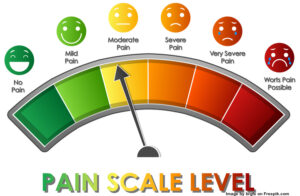
Cancer is a complex and devastating disease that affects millions of people worldwide. Pain is one of the most common and distressing symptoms experienced by cancer patients throughout their journey. Effective pain management is essential to improve the quality of life, enhance their ability to undergo cancer treatments and alleviate emotional distress.
Pain is not a universal experience for all individuals with cancer. Those who do encounter pain may not endure it constantly, as it can be intermittent. The likelihood of pain occurrence is higher in individuals with advanced cancer, which refers to cancer that has either metastasized from its original location or recurred.
There are many different types of pain a person diagnosed with cancer can experience such as acute pain, chronic pain, Nerve (neuropathic) pain, bone pain and/or visceral pain. Regardless of the type of pain experienced, relief is possible.
Strategies for Pain Management in Cancer Patients:
- Individualized Treatment Plans: Every patient’s pain experience is unique, requiring tailored treatment plans. A comprehensive assessment by a multidisciplinary team, including oncologists, pain specialists, psychologists, and palliative care experts, is essential to develop a personalized approach.
- Pharmacological Interventions: Opioids remain the mainstay of cancer pain management, but their use should be judicious. Combining opioids with other analgesics like nonsteroidal anti-inflammatory drugs (NSAIDs) or adjuvant medications can improve pain control and reduce opioid-related side effects.
- Interventional Procedures: For localized pain caused by tumor growth or nerve compression, interventional techniques such as nerve blocks, radiofrequency ablation, or neurolysis can be employed to provide targeted pain relief.
- Palliative Care: Integrating palliative care early in the cancer treatment plan can significantly enhance pain management and overall quality of life. Palliative care specialists focus on symptom management, psychosocial support, and facilitating advanced care planning.
- Non-pharmacological Approaches: Complementary therapies like acupuncture, mindfulness-based techniques, music therapy, and physical therapy can help augment pain relief and improve the overall well-being of cancer patients.
- Psychological Support: Addressing the psychological impact of pain is essential. Psychologists or counsellors can assist patients in coping with pain, managing stress, and addressing emotional distress.
Unfortunately, in some circumstances, pain management for cancer patients can be challenging and may take some time to find the right pain relief. Some challenges that Cancer patients may encounter include:
- Multifactorial Nature of Pain: Cancer pain can be caused by a variety of factors, such as tumour growth, nerve compression, inflammation, and treatment-related side effects. Identifying the specific causes of pain is crucial to tailor the treatment approach effectively.
- Opioid Tolerance and Side Effects: Opioids are commonly prescribed for moderate to severe cancer pain; however, long-term use may lead to tolerance and diminished effectiveness. Moreover, patients may experience side effects like constipation, sedation, and respiratory depression, necessitating careful monitoring and dose adjustments.
- Psychological and Emotional Impact: Chronic pain can significantly impact a patient’s emotional and psychological well-being, leading to anxiety, depression, and a decreased will to fight the disease. Treating pain comprehensively should include addressing the psychological aspects as well.

Engaging in open communication with your healthcare team about the nature of your pain, including its type, onset, and duration, as well as rating its intensity on a scale of 1 to 10, is crucial. Moreover, after starting any pain relief regimen, it becomes essential to promptly report any unusual side effects and whether the pain remains unalleviated. A valuable suggestion is to maintain a journal, documenting these details, which will aid you in providing accurate feedback to your healthcare team.
Pain management is a critical aspect of cancer care, with the potential to improve patient outcomes, enhance treatment compliance, and elevate the overall quality of life for cancer patients. By adopting a multidisciplinary and individualized approach to pain management, healthcare providers can help patients navigate the challenges of cancer-related pain and promote a better sense of comfort and well-being during their journey with cancer.
For more information, please visit this trusted site.
Please contact our Nurses on 07 5445 5794 or nurses@bloomhill.com.au if you have any questions.
The information in this document is based on resources from the Cancer Council Queensland. All information provided by Bloomhill is based on research and best practice guidelines. Our model of care utilizes the Clinical Oncology Society of Australia (COSA) domains of wellness along with available clinical evidence. Always consult your care team regarding matters that affect your health. This is a guide intended for information only.



